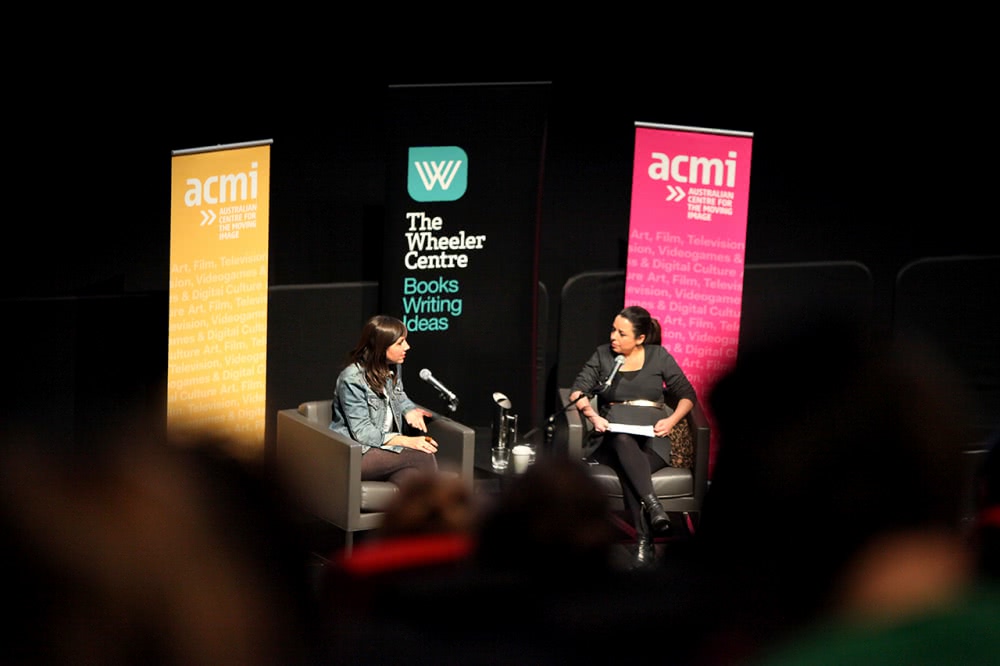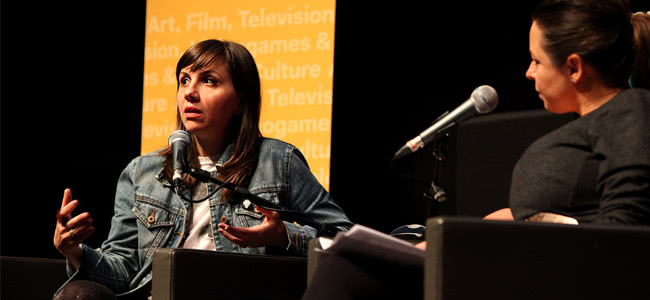Jessica Hopper is the editor-in-chief of the Pitchfork Review, senior editor of Pitchfork, former music editor of Rookie, writer for Rolling Stone, GQ, Spin, and dozens of other big name publications, and recent author of a book, The First Collection of Criticism by a Living Female Rock Critic. Tonight, she is nestled in a comfy-looking chair on an ACMI stage, discussing her work, ideas and life with Myf Warhurst. Two decades ago, however, she was a fifteen year old girl who really, really, really loved Babes in Toyland.
And really, really, really did not love what she was reading about (punk band) Babes in Toyland in the papers.
So she took the only logical course of action available to a smart teenage girl who’s favourite don’t-give-a-fuck punk goddesses were being blatantly misunderstood by the predominantly old white male gatekeepers that make up the traditional music press: called up a major publication, and told them she could do better. Twenty years later, here we are.
Her gutsy start and impressive career are evidence that the advice she gave to the aspiring writers in the ACMI audience works. “Most of the things I’ve learned I’ve learned from doing them wrong,” she said. “Don’t wait around for anyone to give you permission, you’ll be waiting your entire life. You have to just do it.”

Unsurprisingly (her book is titled the First Collection of Criticism by a Living Female Rock Critic, after all,) her discussion at the Wheeler Centre largely around the ways women experience music and the ways they are excluded from it. A lot of what she said is so bloody obvious that it’s inexpressibly frustrating it even needs to be said at all – but it does. It really, really does. Case in point: “Sometimes you should send a woman to interview the female pop star, instead of, like, the 50 year old man to interview Lorde.”
In her talk at the Wheeler Centre, her excellent collection of writing, and her work with Pitchfork and Rookie, Hopper’s writing stands out because she talks about much more than whether or not a particular album or artists or gig is good or not. She cuts through to the meaning that can be found in music if you are incisive enough; meaning that is self-evident, or we wouldn’t all love it so much.
There is a powerful interview in Rock Critic between Hopper and Jim Derogatis, the journalist responsible for bringing R Kelly’s history of sexually assaulting dozens of underage black girls to light. It concludes with Derogatis justifying why R Kelly’s horrifying activities outside of his music should be relevant to critics and listeners. “You have to make a choice, as a listener, if music matters to you more than mere entertainment,” he says, “This is not just entertainment, this is our lifeblood. This matters.”

Hopper is a writer who understands that music matters. It is not just a series of notes jumbled together in a way that is pleasant to listen to, it is identity, connection, and comfort. It is insulation against the everyday; a window into the emotional truth of our shared experiences. It is tied up in ethics and morality. Whole communities spring up around it; hearts and minds and personalities are changed through our listening.
She understands that if something is wrong in music, it matters. If people are being excluded from music, it matters. If a musician does something fucked up, it matters.
She provides what I, for one, as a music fan and critic have craved: intelligent writing that treats music with the respect it deserves.
Photo credit: Nikki Williams
Jessica will be back in the country this September for Bigsound 2015 more info at www.qmusic.com.au/bigsound.




































